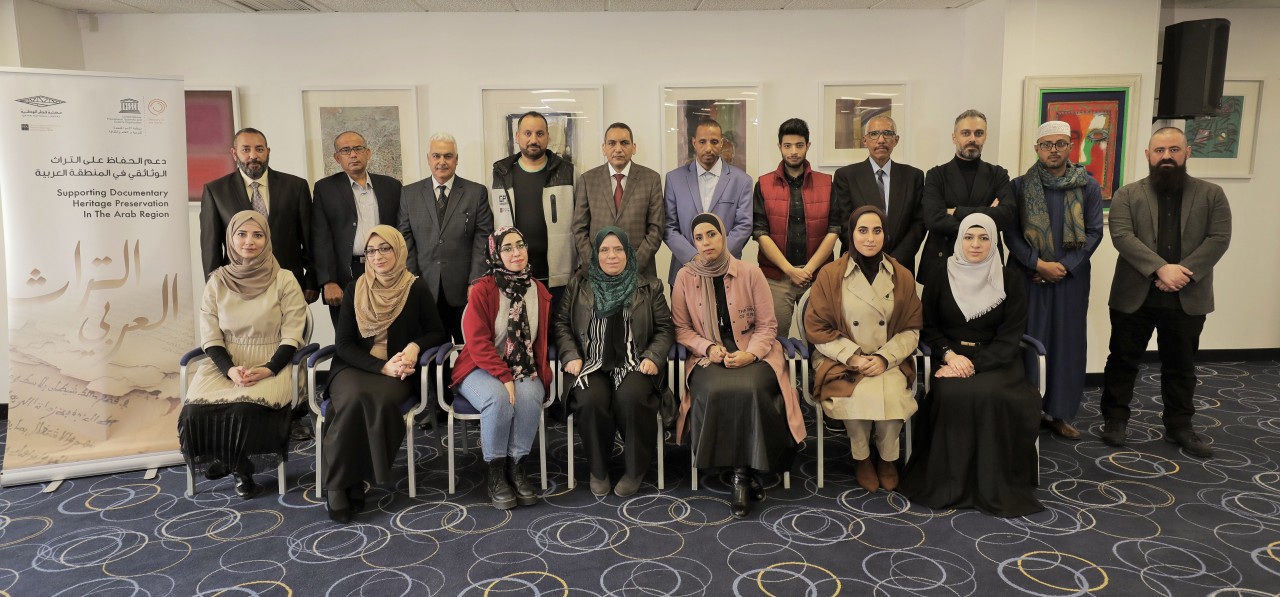Memory Institutions from Arab Region Trained on Collection Management and Documentation Techniques
11 March 2020
The United Nations Educational, Scientific and Cultural Organization (UNESCO) and Qatar National Library, as the IFLA Regional Preservation and Conservation (PAC) Center for Arab countries and the Middle East, jointly organised a four-day capacity building course to support documentary heritage institutions in the Arab region.
Hosted by Abdul Hameed Shoman Foundation in Amman, Jordan, the training took place from 2 – 5 March, and was attended by 18 documentary heritage practitioners from Algeria, Iraq, Jordan, Lebanon, Libya, Mauritania, Morocco, Oman, Palestine, Qatar, Sudan and Yemen.
 ​The training on “Collection Management and Documentation Techniques” focused on best practices concerning documentation procedures such as entry, exit and loans procedures, labelling, cataloguing, and movement control. It included both theoretical and practical sessions, aiming to enhance the skills of the participants in managing documentation procedures manuals and setting up collection management plans to ensure safe, secure and effective management in heritage collections.
​The training on “Collection Management and Documentation Techniques” focused on best practices concerning documentation procedures such as entry, exit and loans procedures, labelling, cataloguing, and movement control. It included both theoretical and practical sessions, aiming to enhance the skills of the participants in managing documentation procedures manuals and setting up collection management plans to ensure safe, secure and effective management in heritage collections.
Anna Paolini, Director of UNESCO GCC and Yemen Office, said:
The Arab region is home to extraordinary cultural heritage. The manuscripts, books, maps, videos and archives of the region are a contribution to the history of humanity, and it is therefore essential to provide documentary heritage practitioners with capacity building opportunities to enhance their knowledge and skills in managing their priceless collections.
Zein Taleb Boubakar, a participant in the training from Library Mahjouby in Mauritania, highlighted the importance of the knowledge shared during the training and its direct benefit to his library:
This training covered some of the important concepts and techniques of collection management and documentation, which are among the top needs of our library. The sessions also increased the awareness of all participants on the importance of preservation of cultural heritage in the Arab world.
The training is part of an ongoing joint project between UNESCO and Qatar National Library titled, “Supporting Documentary Heritage Preservation in the Arab Region,” which plans to safeguard the rich and unique documentary heritage of the Arab region by mapping needs and challenges, providing capacity-building opportunities and enhancing knowledge and information sharing.
Stephane Ipert, Conservation and Preservation Manager at the Library and Director of IFLA Regional PAC Center, said:
We continue our important role in helping to preserve the region’s heritage in an inclusive manner through providing hands-on training opportunities for experts in coordination with our partners. These trainings have proven very useful in building local capacities and empowering the relevant institutions in the region to operate independently from external support, share knowledge and enhance skills.
Experts from across the Arab region will attend another hands-on training session in April this year, which will be held in Tunisia in partnership with the International Centre for the Study of the Preservation and Restoration of Cultural Property (ICCROM), and will focus on preventive conservation, as well as crisis preparedness and first aid to documentary heritage at risk.
Find out more about how IFLA and our partners support preservation and conservation around the world: IFLA Strategic Programme on Preservation and Conservation (PAC)